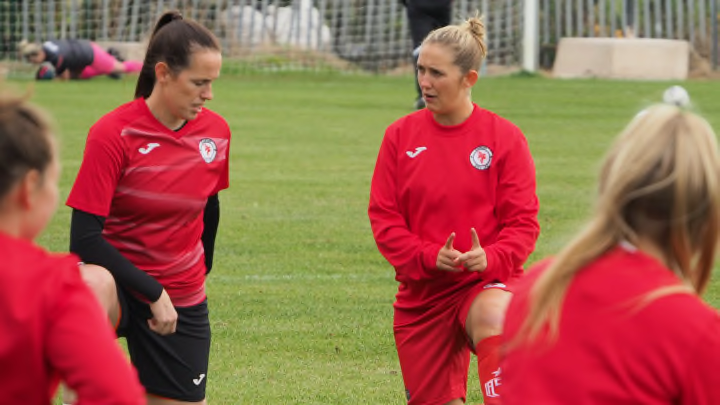Cardiff City LFC: The amateur club on the brink of Women's FA Cup history
By Ali Rampling

Cardiff City Ladies have kickstarted the careers of Sophie Ingle, Natasha Harding and Jess Fishlock, their current goalkeeper was one game away from securing a place at the 2023 World Cup, and they recently knocked Burnley out of the FA Cup.
Cardiff are also a fully amateur, independent club, run by a backbone of dedicated volunteers.
Victory over Championship side Lewes on Sunday would see the club become the first tier four side in Women's FA Cup history to reach the competition's quarter-finals.
"It’s very much family orientated because we haven’t got the backing of a men’s team or anything," long-serving captain Cori Williams tells 90min. "Our coaches and physios, they get paid nothing to be at the club. They’re there because we’re like a family and we love to be there."
Cardiff were briefly attached to the Cardiff City men's team between 2001 and 2003, but have been a fully independent outfit ever since.
Both Cardiff and Swansea have teams connected to their men's sides plying their trade in the Welsh top flight. But in Wales, the independent Cardiff City LFC are the big fish; the only team playing in the English league and a regular home for Welsh internationals, including current Wales number one Laura O'Sullivan.
"We pride ourself on being the only Welsh team that competes in the English system and the FA Cup," adds Williams, who has netted nine goals during this season's cup run.
"For me it’s always been: however good a club is within Wales and playing in the Welsh league, that’s all they’re going to play against. We're quite fortunate being in the English system and the FA Cup; we can compete against the best teams and the best players in England."
The traditional formula for success in the women's game is considered to involve being attached to a big men's club; 11 of the 12 teams in the WSL are connected to a Premier League side.
Cardiff join the likes of Durham and London City Lionesses in bucking this trend.
"You know that everything is solely based on us, and everything we get in and the support and infrastructure that gets put in, that you are being looked after first," Williams adds.
"We were linked to the men’s team at one point, but we pulled away from that because of the stuff that you get with men’s teams; you’re not the first ones to have things and you’re playing second fiddle to the men’s team. You know the club is there for you, and solely you as a team and a player, and that does mean a lot."
Independence has its challenges too. Cardiff are a fully amateur side, with players juggling full time jobs or university with training, matches and a demanding level of travel. Williams works in property development, while first team boss Jamie Phillip is an operations manager.
The team compete in the FA Women's National League Division One South West; the same league as Bournemouth, and the same tier as Leeds and Newcastle, who play in adjacent local divisions. Budgets and resources vary significantly.
"It’s difficult being independent because you have to kind of fund yourself and stand on your own two feet very quickly, otherwise it falls down. Everything that we have, we can’t take for granted," Phillip tells 90min. The former Yeovil boss joined Cardiff as assistant coach last year 'to help out', before taking the top job this term.
"The little things I’m finding this weekend: I’m spending most of my morning today organising the hotel and rooms and little things that people would think clubs have people to do that for them."
Cardiff were relegated from the Southern Premier Division last term while simultaneously dealing with financial difficulties. Phillip describes how it has 'felt like a brand new club' since the summer, with Cardiff in pole position to bounce back to tier three, and pulling off a pair of giant killings against Bridgewater and Burnley to secure their FA Cup fifth round spot.
Phillip and Williams label the increase in FA Cup prize money as 'massive' - Cardiff's thumping 4-1 win over tier three Burnley in round four saw them pocket £15,000. Victory at the same stage last term would have secured just £2,000.
"If we were just surviving, that would keep us running for a good couple of years at least," Phillip says. "We’re in a position where we’re looking to invest it, to push on and compete in the top levels."
And just what would a history-making FA Cup quarter final place mean for 33-year-old Williams, who has been at Cardiff since the age of 15?
"If we did get there it would be the proudest moment I’ve had at the club, definitely."
The FA has already sold over 30,000 tickets for The Vitality Women’s FA Cup Final. Tickets can be purchased at www.wembleystadium.com/tickets/